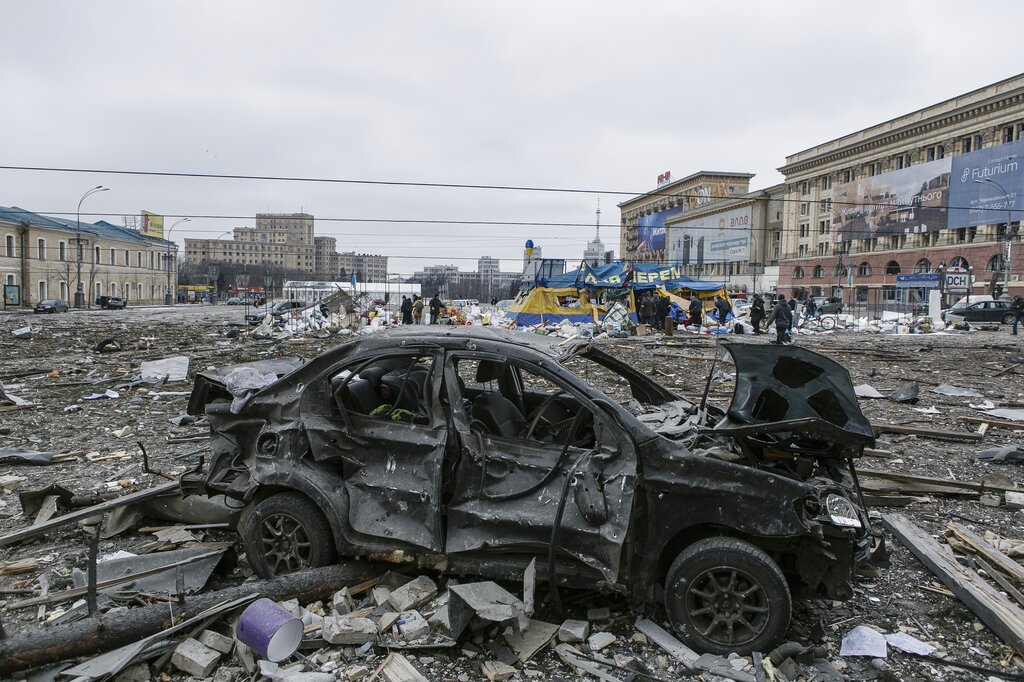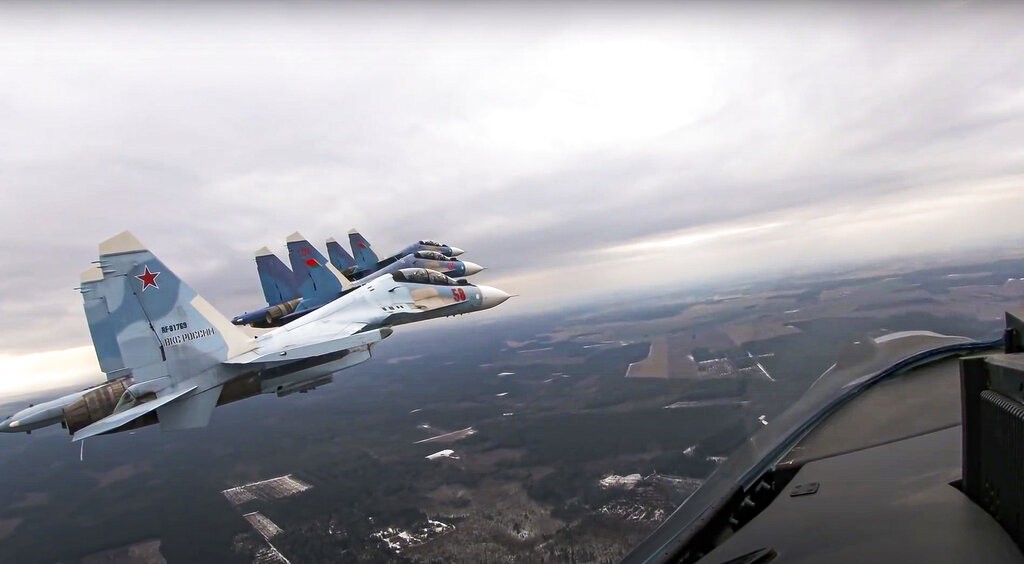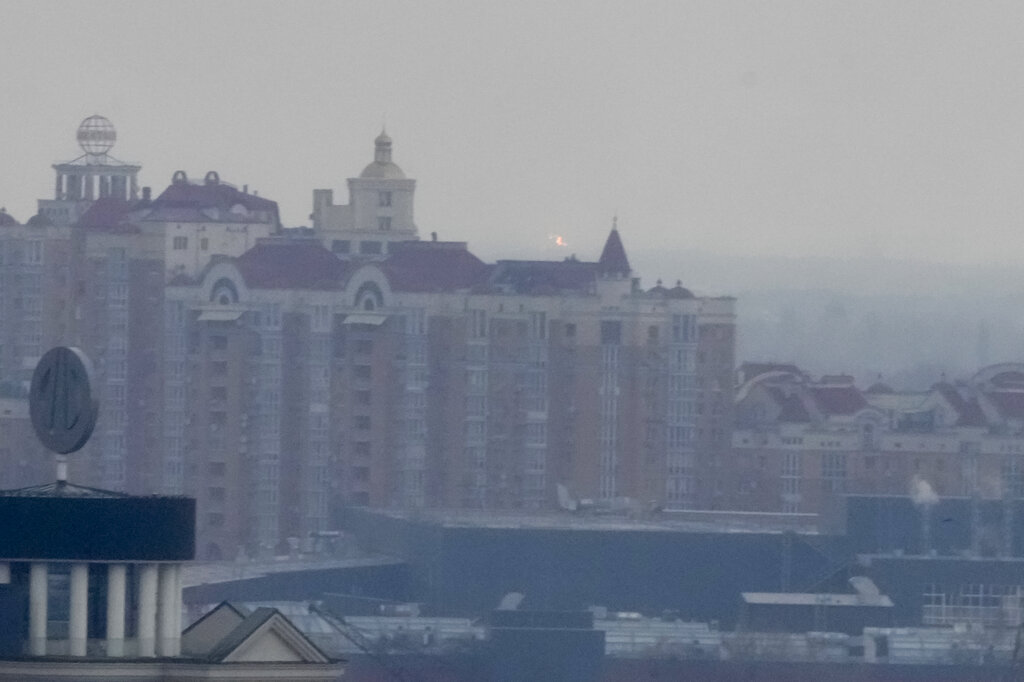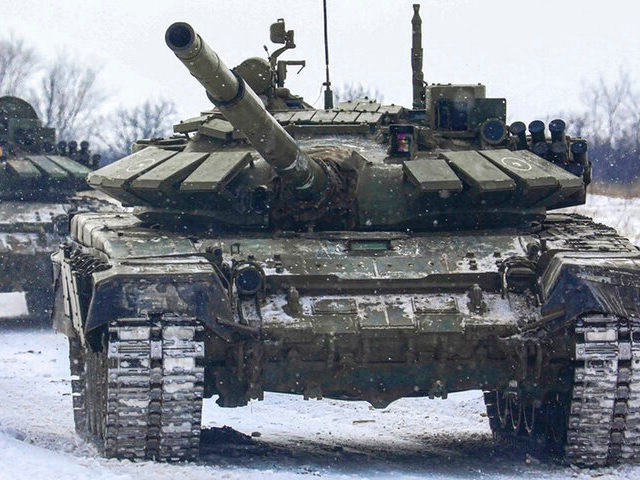International observers generally agree Ukraine did well against the first phase of the Russian invasion, thwarting a blitzkrieg apparently intended to decapitate the Ukrainian government in a matter of days.
As of Tuesday, however, the second phase is underway, and Russia’s enormous quantitative advantage in troops, armor, airpower, and missiles poses an enormous challenge to Ukraine’s determined defenders.
The most visible portent of danger for Ukraine is the huge Russian convoy bearing down on the capital city of Kyiv. Satellite images on Monday captured a 40-mile-long line of tanks, armored fighting vehicles, and support trucks about 17 miles away from Kyiv.
The approach of the convoy was screened by intense Russian artillery and missile fire, a detail Ukrainian President Volodymyr Zelensky alluded to when he told the European Parliament he was taking a break between missile strikes to address it by video call on Tuesday.
The Kremlin on Tuesday denied Russian forces are using indiscriminate cluster munitions and shelling civilian areas, despite copious photographic evidence to the contrary compiled by international journalists.
“Russian troops don’t conduct any strikes against civilian infrastructure and residential areas,” said Kremlin spokesman Dmitry Peskov, while the Associated Press published documentation of “indiscriminate shelling of homes, schools, and hospitals across Ukraine.”
Russian artillery hammered the strategic eastern city of Kharkiv on Tuesday, shattering residential buildings and destroying a maternity ward in an underground shelter. At least six deaths were reported.

A view of the central square following the shelling of the City Hall building in Kharkiv, Ukraine, Tuesday, March 1, 2022. Russia on Tuesday stepped up shelling of Kharkiv, Ukraine’s second-largest city, pounding civilian targets there. Casualties mounted and reports emerged that more than 70 Ukrainian soldiers were killed after Russian artillery recently hit a military base in Okhtyrka, a city between Kharkiv and Kyiv, the capital. (AP Photo/Pavel Dorogoy)
Zelensky denounced the shelling of Kharkiv as “frank, undisguised terror” and said, “nobody will forgive, nobody will forget” Russia’s war crimes.
“This is state terrorism of the Russian Federation,” Zelensky said.
Ukraine’s ambassador to the United States, Oksana Markarova, on Monday accused Russia of violating the Geneva Convention by using a thermobaric bomb on an unspecified target in Ukraine. The claim had not been independently confirmed at the time of this writing.
Human rights groups Amnesty International (AI) and Human Rights Watch (HRW) both accused Russia on Monday of using indiscriminate cluster munitions against civilian targets.
AI said it was able to confirm that a Russian rocket dropped cluster bombs on a nursery and kindergarten in the Ukrainian town of Okhtyrka, killing at least three civilians, one of them a child. HRW said a Russian ballistic missile loaded with cluster munitions struck near a hospital in Vuhledar, killing four civilians and damaging the hospital.
“Drone video footage taken from the scene shows that cluster munitions struck at least seven locations on or near the building, four on the roof and three on the pavement immediately outside the school. Two injured or dead civilians are also visible in the footage, as are pools of blood. An additional 65 photos and videos that Amnesty International acquired from a local source shows more details of the scene, the victims and their family members, and the damage to the school,” AI reported.
The International Criminal Court responded to Ukrainian demands for an investigation of Russian war crimes on Monday, as chief prosecutor Karim A.A. Khan announced there is a “reasonable basis to believe that both alleged war crimes and crimes against humanity have been committed in Ukraine.”
“Given the expansion of the conflict in recent days, it is my intention that this investigation will also encompass any new alleged crimes falling within the jurisdiction of my Office that are committed by any party to the conflict on any part of the territory of Ukraine,” Khan said.
Ukrainian pilots stayed in the air longer than most observers thought possible, but on Monday, the Russian Defense Ministry claimed it was finally able to establish “total air superiority” after five days of combat.
Russian Defense Ministry spokesman Maj. Gen. Igor Konashenkov said Russian forces destroyed eight Ukrainian BUK M-1 air defense systems, one S-300 missile system, three radar installations, and five aircraft during the previous 24 hours.

In this photo taken from video provided by the Russian Defense Ministry Press Service on Thursday, Feb. 17, 2022, Su-30 fighters of the Russian and Belarusian air forces fly in a joint mission during the Union Courage-2022 Russia-Belarus military drills in Belarus. (Russian Defense Ministry Press Service via AP)
“Since the beginning of the operation, Russian forces have hit 1,114 Ukrainian military infrastructure facilities, including 31 command posts and communications centers, destroyed 314 tanks and other armored vehicles, 57 multiple launch rocket systems, 121 field artillery pieces and mortars,” Konashenkov said.
Perhaps because the Russians have achieved air superiority, NATO and the European Union on Tuesday scuttled plans to send jet fighters to Ukraine.
China’s state-run Global Times on Monday posted photos from a Chinese satellite that showed heavy damage to the city of Vinnitsa, where the Ukrainian Air Force is headquartered. The 2,500-meter runway at Vinnitsa Air Base was almost cut in half by what appeared to be a long-range missile detonation, probably on February 24, the first day of the Russian invasion.
The Ukrainian parliament, known as the Verkhovna Rada, said on Monday that Belarusian troops have joined the Russian invasion and are operating on Ukrainian soil. Local Ukrainian media reported that a column of 33 Belarusian units crossed the border and headed for Kyiv.
If confirmed, this development would contradict Belarusian dictator Alexander Lukashenko’s insistence on Monday that he had no intention of supplying troops for the Russian attack. Lukashenko has also denied Ukrainian claims that Russian troops were allowed to pass through Belarus into Ukraine.
Taken together, these developments represent a significant Russian escalation of hostilities – with notably less concern about causing civilian casualties and indeed a willingness to inflict them deliberately – coupled with more combat power moving across the border and more attention paid to protecting Russia’s surprisingly poor logistics.
Asia Times on Monday quoted unnamed European military analysts who said Russia might be flustered that its plan for a swift decapitation victory did not pan out, but its alternate plan to divide and crush the Ukrainian military, with little concern for civilians who get in the way, is proceeding more-or-less on schedule.
“The Russians are in no hurry. They will engage and drive the Ukrainians into several pockets. Then they will ask them to talk or kill them. It’s a time-honored tactic,” one of the analysts said.
Similar notes of caution were sounded by analysts who spoke to the UK Guardian on Sunday. The analysts called Russia out for some unexpected stumbles in the first few days of the invasion and lauded Ukraine’s resistance but warned Russia has enough strategic bulk to absorb both Ukraine’s punches and its own logistical pratfalls.

Flame is seen in the background after an apparent Russian strike in Kyiv, Ukraine, Thursday, Feb. 24, 2022. (AP Photo/Efrem Lukatsky)
The Guardian recounted Russia’s half-hearted attacks on major Ukrainian population centers and strategic targets, in which small squads of unsupported Russian troops essentially waltzed in and expected the Ukrainians to surrender, and the curiously hesitant Russian effort to knock out Ukraine’s air force or protect convoys from Ukraine’s deadly Turkish drones.
Unfortunately for the Ukrainians, Russia is believed to have sufficient resources in place to recover from these mistakes and shift its operations to the kind of bloody slugfest that Ukraine is not big enough to win:
For all the Russian missteps so far, Moscow’s larger forces have made steady progress elsewhere, sidestepping resistance where possible. Its principal invasion forces have headed to Kyiv, and on Sunday night, the city’s mayor, Vitali Klitschko, said in an interview, “Right now we are encircled”. This was later clarified by his press team who said Klitschko was speaking figuratively and that Kyiv wasn’t literally blocked.
Russian forces also appear to be gradually cutting off the south, east of Kherson, on the mouth of the Dnieper, with only an increasingly isolated Mariupol holding out. In other words, the Russian mistakes may have only obscured the underlying strength of its overall position.
“The anxiety is that Putin may resort to urban warfare – grim combat where an attacker is considered to need an advantage of five to one to prevail. It is not clear how organized Kyiv’s defenses are, given Zelenskiy’s last-minute mobilization last week, but one way Russia could force a victory is to use weaponry indiscriminately, particularly if Putin is determined to gain a quick win in order to save face,” the Guardian grimly concluded.

COMMENTS
Please let us know if you're having issues with commenting.